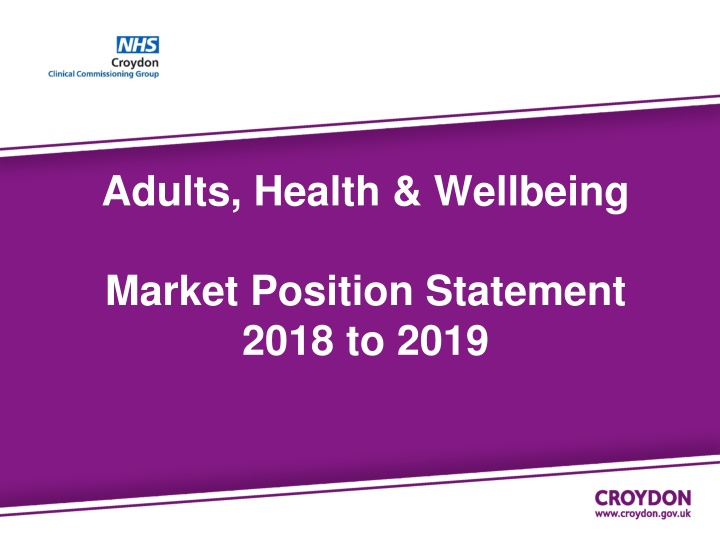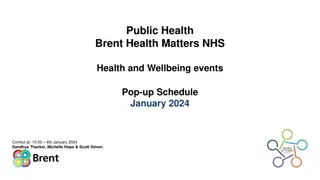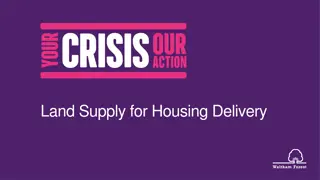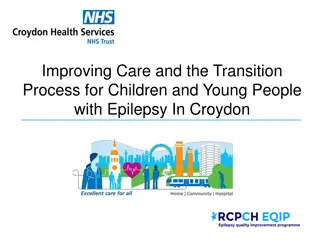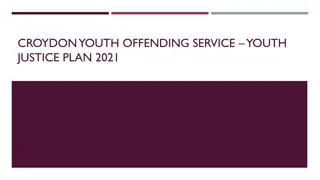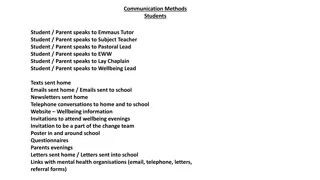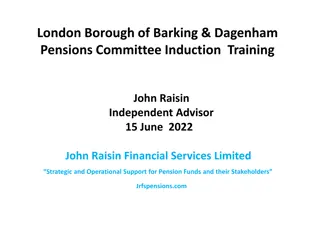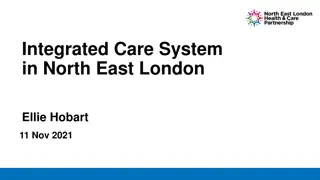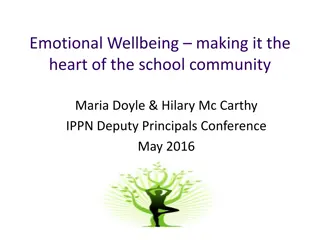London Borough of Croydon Adult Health & Wellbeing Market Position Statement 2018-2019
The Market Position Statement (MPS) by London Borough of Croydon aims to enhance communication between the council, service providers, and users to ensure quality services for adults with care needs. It outlines market opportunities, challenges, and the strategic direction for service development, emphasizing independence and community resilience. The document reflects Croydon Council's ambitions for a clean, safe, healthy, and inclusive place for all residents, with equal access to housing, jobs, care, and education.
Download Presentation

Please find below an Image/Link to download the presentation.
The content on the website is provided AS IS for your information and personal use only. It may not be sold, licensed, or shared on other websites without obtaining consent from the author.If you encounter any issues during the download, it is possible that the publisher has removed the file from their server.
You are allowed to download the files provided on this website for personal or commercial use, subject to the condition that they are used lawfully. All files are the property of their respective owners.
The content on the website is provided AS IS for your information and personal use only. It may not be sold, licensed, or shared on other websites without obtaining consent from the author.
E N D
Presentation Transcript
Adults, Health & Wellbeing Market Position Statement 2018 to 2019
1. Introduction The Market Position Statement (MPS) for London Borough of Croydon (LBC) is aimed at both existing and potential providers of Adult Care and All Aged Disability services currently operating or planning to operate in the local area. It aims to maintain and improve the dialogue between the Council, providers, people using services and carers in order to stimulate an active, responsive and quality supply of services that meet the needs of adults and their families with social care needs. LBC is committed to ensuring that service users are offered real choice and control over how they are supported to meet their aspirations and sustain their independence for as long as they can. The MPS contains some market opportunities for partners that are intended to help identify what the future demand for care and support might look like. However, we fully recognise that the long term solutions to many people s care and support needs sits within their families, social networks and their communities. Underpinning all of our commissioning intentions is the fundamental belief that all providers have a responsibility to ensure that these resources are maximised to harness resilience at an individual and community level as well as encourage mutual support to deliver against the Council s Ambition Priority Two, Independence; helping our residents be as independent as possible. Changing demographics, such as the expected increase in Croydon s population and an ageing population that is living for longer (with co-morbidities), has led to an increase in demand for services. The rising expectations of service users and reductions in the availability of public funds, presents a significant challenge for the Council as commissioner and providers alike. The MPS contains analysis of current and future needs and describes the strategic direction for service development as part of a whole systems approach, thus enabling providers to be creative and innovative in their responses to meet the needs of our community. Many of our services are jointly commissioned with Croydon CCG and GP Networks. This document is a live document which forms part of a two way conversation between providers and commissioners, therefore will be updated with responses from all partners. Section XX gives details on how providers can get involved in developing and shaping services. 2
2. Croydon Councils Ambition Our ambitions for Croydon are much the same as yours, we want to create a Croydon that is: Clean and Green - where we cherish our parks and open spaces and our streets and neighbourhoods are clean A Place to call Home - decent, truly affordable homes for all, and nobody forced to live on our streets A Safer Place - that is safe for everyone, particularly our young people A Healthy Place - with access to effective care and health services when needed A place where our young people can thrive and reach their full potential A place that values the arts and culture, where sport is accessible and encouraged A place where you have an opportunity to work and build your career To be its very best, Croydon must have equality of opportunity for all our residents Croydon people must have equal access to homes, jobs, care and education 3
3. Purpose & Vision The Health, Wellbeing and Adults Services Purpose and vision is; To support service users and their carers with care and support needs Focus on Prevention and Early Intervention To maximise on the life chances and outcomes for service users, based on a whole family approach to services To facilitate Better coordination and integration of services To support Health, Wellbeing and Adults Services the Commissioning & Procurement Service Purpose and vision is; To deliver excellent commissioning outcomes Help services improve delivery and performance and; To deliver excellent travel and equipment services to Croydon residents 4
4. Strategic Priorities for Health, Wellbeing and Adult Social Care At the heart of our MPS is the need to provide a support system that is equipped to respond effectively to each individual s needs and preferences, in order to successfully achieve against their chosen outcomes. We will work with partners to protect adults who need care and support from harm and abuse. We want to ensure that service users and carers receive the right care, in the right place, at the right time. The operating model for All Aged Disability Services is centred on embedding a strength based, preventative model of support to promote wellbeing, self-care and independence. We want to reduce dependency on services and deliver better care by supporting those of working age to live independently in a home of their own and improve our offer to older people by supporting them to remain in their homes, and continue to reduce our reliance on the use of residential care. We will continue the work with children s social care, education (SEN), schools and health partners to improve our support for young people and their families in transition into adulthood. We will improve the customer experience by increasing our understanding of the impact and benefit of what we do. We will use this knowledge to innovate and improve the way we work and commission services. The Transforming Care Programme continues to underpin all of our work with people who have a learning Disability and/or Autism. A key focus this year will be to ensure that those who have been in a hospital setting for longer than five years are supported to move into a community setting which meets their personal support needs and emotional aspirations. 5
The NHSE 5 Year Forward View (5YFV) for Mental Health will continue to steer the Council & its partners strategic direction of travel for developing local services for people who suffer from mental health issues. The 5YFV emphasises the need to: address the relationship between mental and physical health; prevention and earlier intervention; focus on improving well-being rather than illness; look at the wider impacts on mental health such as housing, employment & leisure, and help reduce the stigma associated with mental health. Together these changes mean a continued shift away from the traditional service provision model towards a model that encourages flexible, person centred, quality services that promote choice and independence and are delivered at affordable rates. A key driver for making this shift is our commitment to develop a digital offer so that service users can independently access information and make informed choices; including through an e-market place. This shift also impacts on the way in which we will commission services in future. The Council intends to quickly move away from traditional framework and spot contract arrangements to developing a technologically advanced platform through a Dynamic Purchasing System (DPS for some areas of care and support. The strategic priorities below underpin everything we do and set out the principles for how we approach commissioning high quality services that prevent, postpone or minimise the need for formal care, whilst providing value for money and safeguarding users from abuse. 6
Personalisation What does this mean? Every person assessed as eligible for a service has choice and control over the shape of their care and support in all settings Every person assessed as eligible for care has a personal budget determined through a Resource Allocation System (RAS) using a strength based assessment and support planning approach An increase in the number of people using a direct payment to purchase services How this can be met? The provider market to be flexible in their business approach by developing affordable financial structures that enable self-funders, service users and carers to purchase services with the aid of direct payments and personal health budgets Providers should market their options to people who use services Work collaboratively to develop a richer shared understanding of what people want 7
Personalisation How this can be met? Work collaboratively to develop an e-market place for people to access services, technology and equipment that supports them in meeting their desired outcomes Shape the market to ensure supply of PA s and access to appropriate support services through direct payment and personal budgets With more personal budgets and people taking up direct payments, providers might offer support planning and brokerage depending on the funding model, in each service area 8
Strength Based Approach What does this mean? A collaborative approach between the person being supported by services and those supporting them, allowing them to work together to determine an outcome that draws on the person s strengths and assets How this can be met? A shift in culture and practice across all services including provider workforce Redesign of the Social Care Front Door and assessment and support planning processes to ensure different questions are being asked in a way that protects the individual s independence, resilience, ability to make choices and wellbeing When assessing people understand the full range of assets available to them to deliver the required outcomes whether they are friends, family, community assets or their own resources Use provider staff as well as assessment and case management to establish creative support planning Develop a borough wide view of available resources, not commissioned by the council, to enable people to access as part of their care package 9
Personalised and Sustainable Outcomes Based Commissioning What does this mean? Every person has choice and control over the shape of their care and support in all settings Personal, sustainable outcomes are delivered that maximise independence and choice People are supported to plan for a fulfilling life in accordance with their individual aspirations and goals maximising their life chances wherever possible Commissioning focus to increase on whether services can achieve positive outcomes rather than just outputs More flexibility to providers to increase the range of care options available. Providers allowed to be creative to meet outcomes How this can be met? Ensure that Adults, Health and Housing have defined shared outcomes Services (including the provider workforce) need to be focussed on the outcomes that people want to achieve, and the progress they want to make, rather than set tasks and activities delivered in set time period 10
Personalised and Sustainable Outcomes Based Commissioning How this can be met? Individuals service users to be fully involved in decision making around their care and support at every stage and in an ongoing capacity Services should support individuals to exercise choice and control over their lives in a way that reflects their individual preferences and diverse needs More people will be purchasing services with the aid of a direct payment and/or personal health budget, and there will be integration in the approaches taken by health and social care such as through an Integrated Personal Commissioning (IPC) delivery model Service to be commissioned to meet specific outcomes for people beyond fulfilling hours of care by purchasing care against bespoke support plans through a Dynamic Purchasing System (DPS) 11
Prevention & Early Intervention What does this mean? In order to achieve better for less, we want all our services (including the provider market) to be working towards delaying a person s decline and reliance on long term or emergency care, and where possible, people should be supported to regain health and independence Encouraging people to make positive lifestyle choices which can help reduce potential negative health impacts so that they can live longer, healthier lives especially in parts of the borough where there are health inequalities Ensuring that people have easy access to local information, advice and advocacy, in a way that makes sense to them and which supports them to make good informed decisions about their care and support Ensure that Council and Health Colleagues work collaboratively to provide a collective approach to people in the provision of information, advice, prevention and early intervention Support carers by recognising, valuing and supporting them to remain mentally and physically well and enabling then to fulfil their potential in all aspects of their lives 12
Prevention & Early Intervention How can this be met? All service to develop ways to keep people in their homes and communities with reablement, independence, social inclusion and wellbeing as key outcomes that we can all achieve Support for people to live independently is reflected in all policies, in particular in housing policies with a focus on extra care to reduce reliance on residential and nursing care An increase in the use of Assistive Technology and monitoring devices such as Just Checking to support people to remain independent and live safely at home Services to take a preventative / early intervention approach to help reduce negative impacts of health and care related issues by actively seeking ways in which they can support people to improve and maintain their health and wellbeing Enhance the use of Telecare across the social care offer by implementing a new model for the use of Telecare using both hardwired and standalone equipment and apps Creating individually tailored opportunities for people to have fulfilling lives in ordinary setting such as being employed, volunteering and/or participating in meaningful occupation. 13
Residential and Nursing Care only where this is the best option What does this mean? Reduce the over reliance on placements into and people in residential and nursing care to a more independent and supported pathway Older people should be supported to remain independently in their homes and communities without needing to be admitted into 24 hours residential care Working age adults with disabilities are supported to remain in their own homes and communities by developing a fit for purpose housing stock that meets demand including meeting the needs of young people in transitions with complex needs and accessible / adapted housing for those with a physical disability Reduce the number of people with specialist needs being placed outside of Croydon and develop local services to enable people to return back into the borough, in particular for adults with a learning disability and older people with dementia Develop an effective and fit for purpose Independence and support pathway, recognising the need for 24 hour high intense support but providing a seamless step down pathway to enables people towards independent and supported living options 14
Residential and Nursing Care only where this is the best option How this can be met? Work with providers to develop an effective Independent Living and Support Pathway for people with complex needs. The pathway will be flexible and seamless in providing step up and step down options for people needing high intensity 24 hour care enabling them to work towards medium, low support and independent living pathways Work collaboratively with providers to broaden the range of specialist options that supports the return of people placed out of borough, e.g. deregistering residential care homes to create supported living services Work collaboratively with providers to develop more elderly mentally infirm / nursing care provision in the borough Supporting people to get their confidence back and learn / re-learn activities of daily living following illness, accidents and other life changing events to provide better long term solution other than the reliance on residential and nursing care Ensure that all provider services help to avoid hospital admission where possible, support people to return home promptly when ready and prevent readmission if possible 15
5. Market Headlines Overarching headlines across all care groups a) There is an increased demand for care and support services due to an increase in the overall population of Croydon and this is set to rise year on year. This increase in demand comes at a time of reduced public funding for Croydon s health and care services b) The Council s commissioning arrangements will shift towards an Outcomes Based Commissioning approach using digitally enhanced platforms such as an E-market Place and Dynamic Purchasing System (DPS). All providers delivering a package of care and support to service users and carers, wanting to do business with the Council will be expected to transition from traditional block and spot contract arrangements to the DPS and acquire placements through this platform. c) Services will need to be flexible in their business approach by developing affordable financial structures that enable self-funders, service users and carers to purchase services with the aid of direct payments and personal health budgets. d) Services will have the opportunity to develop innovative service models that align to an independent and prevention pathway in order to reduce reliance on residential care and repatriate service users back into the borough. e) There will be an increased emphasis on outcome focused services, which means that we will be moving towards commissioning against defined outcomes agreed by the provider and service user instead of the usual method of set hours and tasks . 16
We are increasingly jointly commissioning services with NHS partners and other local agencies and through this we are looking for responsive and flexible models of support that prevent hospital admission and/or support effective hospital discharge. f) There will be an increased expectation that providers of care accommodation will be focused on maximizing the health and wellbeing of their clients, with a range of services to support this g) With NHS partners we are looking to establish the micro-provision of very local services around the footprint of Croydon s six GP networks. h) Numbers of service users using direct payments will rise, meaning that providers will increasingly be marketing their services direct to users. i) j) Service users and their carers will have more information, advice and guidance about services that are available as the council develops this aspect of its role. This will include a new e-marketplace of services, which will launch in 2018 17
Market Headlines Learning Disability Transforming Care Programme will mean a potentially small rise in the demand for bespoke supported living settings and support services, which will meet the needs of individuals with learning disabilities and autism who have complex needs. The challenge will be to have accommodations and support options available to provide services that will enable people to live sustainable lives in community settings once discharged from hospital. There will be a clear emphasis on supporting people with learning disabilities to meet their life aspirations in areas such as volunteering, employment, education and independent living. There will be market opportunities for those providers who can innovate and develop services that support people with learning disabilities to better access community opportunities including effective crisis care, family and individual outreach. An increase in the level of complexity means that the market needs to consider a different model of care including day opportunities, shortbreaks and respite as part of a holistic service offer. More and more people with learning disabilities will reach pensionable age over the coming years. We want to see the development of specialist residential and nursing care services to support this growing part of our community. 18
Market Headlines Physical and Sensory Disabilities Increased opportunity to develop service models that focus on prevention and early intervention. There are opportunities for services to increase the use of assistive technology to support independence and inclusion. Opportunities to increase supported living models of care through new services and remodelling existing residential care 19
Market Headlines Mental Health Opportunity to develop a service model that focusses on an independence and support pathway to offer a step up and step down for service users with complex mental health issues. Opportunities to develop preventative services that harness the potential of service users to access locally based service in their communities such as peer support. Opportunities to increase supported housing models of provision Market Headlines Dementia Care Croydon Council is committed to becoming a Dementia friendly borough. We require the development of a range of services that support service users across all spheres of the dementia pathway from diagnosis to post diagnostic support either at home, intense support during crisis or in specialist care settings. 20
Market Headlines Carers Croydon Council has a significant BME population which is set to rise over the next 15 years. A range of opportunities is sought to better reflect the differing needs and cultural backgrounds of our carers. We are interested in innovative and holistic solutions that support carers need to help them fulfil their roles The Council is looking to develop community alternative to residential respite, increase carer DPs and the range of options available to them. Day Care Opportunities There are plans to transform day care opportunities across all adult service user groups with a view to reducing centre based provision in favour of increasing personalised support around individual service users. 21
Market Headlines Extra Care and Supported Living The number of council residential and nursing care placements will reduce the number of adults placements into nursing and residential care will reduce. Whilst we will use more residential and nursing care for older people this will be a smaller proportion of those older people receiving social care support. Cost effective alternatives to residential care are being sought. Opportunities to expand the offer of Assistive Technology in the provision of extra care and supported living is highly desirable. The demand for domiciliary care is likely to rise as more people receive this kind of support instead of residential care, and as their needs rise, there will be a greater demand for housing that offers integrated care and support to older people. 22
Market Headlines Residential and Nursing Care Reduce the number of people entering residential care by preventing the need through the use of alternative support and Assistive Technology that enable a service to remain in their home for as long as they can. Reducing the number of people in residential care by developing a step down independence and support pathway across all care groups. There are plans to decrease the number of Council funded care home placements in favour of more personalised housing options, including Extra Care Housing, supported living and Shared Lives. The Council wishes to discourage the development of residential homes in Croydon. The borough is a net importer of people into its local care homes resulting in pressures on the local health economy through GP provision to local homes and through A&E attendances at the Croydon University Hospital. 23
6. Headlines on Demand for Services Population: 1. a) There an expected rise in the overall population of Croydon. In 2016 there were 383,300 people in Croydon making it the second highest in London. By 2030 there will be 441,477 people in Croydon with an increase in population by 12% over the next 15 years. The table below outlines the projections for population in Croydon over the next 30 years. Population of Croydon 600,000 490,901 500,000 461,477 441,922 400,273 382,304 400,000 363,378 300,000 330,587 200,000 100,000 0 2001 Census 2011 Census 2016 GLA MYE 2020 2030 2040 2050 24
a) There will be older people, living longer. The below chart shows the increases in the three age groups for Croydon from 2016 to 2050. b) Croydon s older population is predicted to increase by nearly 50% by 2030 and more than double in size (103%) by 2050, from 50,206 in 2016 to 102,024 by 2050. This moves the older population from making up 13% (2016) of Croydon's population to 21% (2050) of the population. This will bring Croydon's over 65's in line with Croydon's 0-17 year olds. 25
c) Rates for older people living alone, by age and gender in Croydon 2. Older People: Age / Year Aged 65-74 Aged 75+ 2016 6,910 11,533 2017 7,040 11,662 2020 7,520 12,578 2025 8,230 14,885 2030 9,860 17,029 a) People unable to manage at least on self-care activity on their own, by age and gender, projected to 2030 Gender / Age / Year 2016 2017 2020 2025 2030 Males aged 65+ (personal care) 5,849 5,970 6,514 7,559 8,951 b) Projections for number of older people unable to manage at least one domestic task on their own, by age and gender in Croydon to 2020 d) Projections for number of older people living alone in Croydon to 2030 Gender / Age / Year 2016 2017 2020 2025 2030 Males aged 65+ (domestic tasks) 6,770 6,931 7,599 8,842 10,450 Age range Aged 65-74 Aged 75+ % males % females Females aged 65+ (domestic tasks) 13,726 13,967 14,974 17,045 19,811 20% 34% 30% 61% 26
Learning Disabilities: d) People predicted to have a moderate or severe learning disability and be living with a parent in Croydon, by age, projected to 2030 a) People predicted to have a learning disability in Croydon, by age, projected to 2030 Age / Year 2016 Aged 18-64 5,865 Aged 65+ 1,043 2017 5,914 1,070 2020 6,039 1,143 2025 6,243 1,306 2030 6,409 1,532 2016 2017 2020 2025 2030 Age / Year Aged 18-64 507 510 514 528 548 b) People predicted to have a moderate or severe learning disability in Croydon, by age, projected to 2030 Age / Year Aged 18-64 Aged 65+ 2016 1,339 142 2017 1,351 145 2020 1,382 154 2025 1,431 175 2030 1,474 206 c) Down's Syndrome, Autistic Spectrum Disorders and Challenging Behaviour projection to 2030 Age / Year Down's syndrome 2016 2020 150 Autistic spectrum disorder 2016 2020 2,354 2,437 Challenging behaviour 2016 2020 108 2030 164 2030 2,597 2030 118 Aged 18-64 155 111 27
Adults with mental health: a) People aged 18-64 predicted to have a common mental health disorder in Croydon, by gender, projected to 2030 Gender / Year Female Male All 2016 2017 2020 2025 2030 24,270 14,638 38,908 24,467 14,788 39,255 24,980 15,163 40,143 25,689 15,700 41,389 26,181 16,188 42,369 b) People aged 65 and over predicted to have dementia in Croydon, by gender, predicted to 2030 Gender / Year Female Male All 2016 2017 2020 2025 2030 2,202 1,316 3,518 2,272 1,377 3,649 2,409 1,505 3,914 2,764 1,771 4,535 3,266 2,151 5,417 28
Adults with Physical Disabilities and Sensory Impairments: a) People aged 18-64 with moderate and serious physical disability projected by 2030 Type / Year Moderate Serious 2016 18,175 5,243 2017 18,423 5,335 2020 19,115 5,611 2025 20,029 5,946 2030 20,431 6,050 People aged 18-64 with moderate or serious personal care disability in Croydon, projected to 2030 b) Age / Year Aged 18-64 2016 10,835 11,008 11,511 12,128 12,324 2017 2020 2025 2030 People predicted to have a moderate or serious personal care disability in Croydon, by age, projected to 2030 c) Age / Year Moderate 2020 178 832 1694 2646 4074 Serious 2020 118 238 350 594 787 2016 185 819 1610 2720 3520 2030 206 794 1810 2871 4409 2016 124 234 333 611 680 2030 137 227 374 645 852 Aged 18-24 Aged 25-34 Aged 35-44 Aged 45-54 Aged 55-64 29
People predicted to have a long standing health condition caused by a stroke, and people who have either Type 1 or Type 2 diabetes in Croydon, by age group and gender d) Age / Year Stroke (long standing health condition) 2016 321 430 369 727 690 1,157 1,266 Diabetes (Type 1 or 2) 2016 3,116 2,939 4,360 3,320 7,476 6,259 2020 334 467 388 799 722 2030 359 617 421 1,089 780 1,706 2020 3,296 3,191 4,619 3,640 7,915 6,831 2030 3,517 4,209 4,982 4,928 8,499 9,137 Aged 18-64 Female Aged 65+ Female Aged 18-64 Male Aged 65+ Male Aged 18-64 All Aged 65+ All People aged 18-64 predicted to have a serious visual impairment, or a moderate/severe hearing impairment, in Croydon, projected to 2030 e) Age / Year Visual impairment 2016 2020 156 Hearing impairment 2016 2020 8,776 9,457 2030 171 2030 10,195 Aged 18-64 161 30
Adults with Substance Misuse: a) People aged 18-64 predicted to have an alcohol or drug dependency in Croydon, projected to 2030 Gender / Year Female Male All Alcohol dependency 2016 2020 4,066 4,184 10,188 10,553 14,254 14,737 Drugs dependency 2016 2,834 2,916 5,270 5,459 8,104 8,375 2030 4,386 11,266 15,652 2020 2030 3,057 5,828 8,885 31
6. Overarching Commissioning Themes Direct Payments The Council plans to significantly increase the use of direct payments to give greater independence, choice and control to service users. Presently the proportion of direct payments users in Croydon stands at around 11.8% and is well below the London average of 27.6% and the England average of 28.1%. The Council wants to the take up of direct payments for both self-managed direct payment users and managed direct payments where providers hold funds for service users that can be drawn down to pay for services as and when required. We are facilitating the pooling of direct payments across service users to purchase group services. This has begun with a supported self-employment academy. Increasing the use of direct payments requires changes to the Council s assessment and business processes and the advice and support given to service users. Key to increasing direct payments take up will be increasing the scope, diversity, flexibility and affordability of service options available in the local market and increasing the local pool of skilled Personal Assistants. Some providers will need to adapt their service models to make the shift away from their funding coming through grants and block contracts towards service models funded directly by individual service users and service users who pool their resources. 32
Information, Advice and Advocacy The Council is looking to improve the ways that service users, their families and carers can access the information, advice and advocacy they need to realise their personal goals. Increasingly service users and carers are accessing information, advice, support and services on-line and the Council is reviewing these on-line service channels to ensure that they are user-friendly and appropriately accessible. The range of information available on-line is being reviewed and refreshed. This includes the development of e-market channels to enable service users to identify and arrange their services when and where they want them. Local service providers will need to take part in the development of the Council s information and advice service developments to better communicate their service offers to the local community. The Council has let a contract for independent service user and carer advocacy to Advocacy for all in partnership with Croydon MIND, who will work with the Council and local service providers in developing their services and representing the views of service users and carers. 33
Residential and Nursing Care Traditionally there has been an over reliance on 24 hour Residential and Nursing Care across All Aged Disability Services and this is a trend that we are committed to change in order to support service users to maximise their level of independence and remain in their homes and/or local communities for as long as they can. Below is an illustration of the total placements paid for in the independent care sector for financial year 2017/18 and those that are being planned for in 2018/19. These also include placements where individuals are also making a top-up payment. Older People (aged 65+) Placements paid for in 2017/18; Residential Care beds = 307 Residential Care with Dementia beds = 143 Nursing Home beds (excluding Funded Nursing Care) = 288 Nursing Home with Dementia beds (Excluding Funded Nursing Care) = 213 Older People (aged 65+) Placements planning to be paid for in 2018/9; Residential Care beds = 379 Residential Care with Dementia beds = 75 Nursing Home beds (excluding Funded Nursing Care) = 392 Nursing Home with Dementia beds (Excluding Funded Nursing Care) = 121 34
Working Aged Adults (aged 18-64) Placements paid for in 2017/18; Residential Care beds = 819 Nursing Home beds (excluding Funded Nursing Care) = 176 Supported Living beds/ unit = 226 Working Aged Adults (aged 18-64) Placements planning to be paid for in 2018/9; Residential Care beds = 761 Nursing Home beds (excluding Funded Nursing Care) = 176 Supported Living beds/ unit = 223 Around 32% of all placements are made out of borough with over half of the placements made for people with learning disabilities and physical disabilities made out of borough. The Council is keen to work with local providers to increase the proportion of service users placed closer to their local community. The Council wishes to discourage the development of residential homes in Croydon. The borough is a net importer of people into its local care homes resulting in pressures on the local health economy through GP provision to local homes and through A&E attendances at the Croydon University Hospital. 35
Service user and family and carer priorities An independent consultation of the views of adults with learning disabilities, adults with disabilities and adults with sensory impairment has set out clearly what service users and their families and carers want from the Council and any organisations providing them support. These wants are: A nice place to live that is stable, personal and makes us happy. Choice about where we live and who we live with. A loving and supportive family. A break from our family when we need it. A family of our own if we choose, with a partner and/or children Meaningful relationships with the people in our lives. Friends around our own age with whom we have things in common. Friends who we can meet, do things with and talk to regularly A reason to get up in the morning. To feel like we make a contribution or a difference somehow to the world or others. For example we may work, study, volunteer or care for others To be able to move around freely and independently. To be able to go where we want, when we want To be treated well by others. To be treated equally. To be listened to and considered an important voice in the world To learn new things and develop our skills. To be able to use our skills in a way that allows us to grow and achieve results. To change what we do as our interests and lives evolve A sense of security that things are not just going to be taken away or change suddenly. Feeling like we are in control of what happens to us 36
Families, parents and carers tell us they need: Reliable, timely and dependable (day and respite) services, of a reasonable quality Information about what is available and how to access it Advocacy and support To be listened to and treated as experts in our loved one s needs Help to think about and plan for the future To be involved, and to get advanced notice if there is to be change 37
Micro-Market Development Croydon understands that we may have a wide group of existing micro providers in the area, who can be hard to identify and engage with. They provide a valuable service in local areas yet they face growing regulatory, legislative and other barriers because of which, in most areas, the numbers are falling. We recognise that in every area there are entrepreneurs who would be willing and able to set up new, innovative and highly personalised service options if only they knew what people needed and had the information and support that they need to do so with confidence. What micro-providers have in common is that they want make a difference to the lives of the people they support and have a very personal interest in how the service is delivered. A micro-enterprise does not necessarily have to look like a traditional business and people considering setting one up can do so in lots of different ways. Micro-services may be delivered by any one of a wide range of business models including: 1. Sole trader, small business, social enterprise, not for profit, charity, or voluntary organisation. 2. They may be delivered on a paid, barter or voluntary basis. If provided for payment, that payment may form all or part of someone's income or may simply cover the costs of delivering the service 38
3. Micro-providers are usually self-employed and some do not employ any staff but directly deliver the service themselves. Others employ a small number of (usually local) people to support what they are doing 4. Micro-services may be delivered on a full time or occasional basis fitting in with other employment, caring responsibilities or study 5. They may be established or newly emerging 6. They may include older people or those who have an illness or disability (who may be users of services themselves) who want to deliver social support or care services They may include the families or friends of older people or those who have an illness or disability who want to deliver social support or care 7. Through this MPS Croydon Council articulates its commitment to work and support Micro-providers and Micro-entrepreneurs in developing opportunities in the market. A key vehicle to deliver this will be the E-Marketplace and DPS that can be accessed by any provider in particular micro providers to inform local people of their service offer. 39
8. Market Opportunities - Services for Older People Through our strategic commissioning priorities for services to older people we plan to work with the market to reshape local provision in the following ways: Develop high quality community based services that contributes to the One Croydon Alliance Integrated Care Networks model of care with a focus on prevention and early intervention; Reduce long term care packages through targeted reablement services; An increase in service users taking up Direct Payments and self-directed support to purchase their own community based care and support from locally based micro markets Introduce a dynamic purchasing system for commissioning care and support Develop a high quality care homes market that works as part of the One Croydon Alliance model of integrated care. Priced appropriately and with increased access to borough based nursing home places and a reduction on placing people out of borough Facilitate a skilled local health and care workforce with all employees paid at least the London Living Wage Support providers in the local care market who want to collaborate and innovate for sustainable service models as part of the One Croydon Alliance. 40
Market opportunities to autumn 2019 will include: Local Voluntary Partnership Tenders going live in June with latest projection for contract start date being 1st November 2018 Home From Hospital Careline Plus Service Older People Floating Support Reablement Pathway 3 Pilot Reablement Pathway 3 Full programme We are currently conducting three reviews that may result in further commissions 41
9. Market Opportunities - Adults with Physical & Sensory Impairments Support more people with disabilities and sensory impairment into employment and or training and education Develop high quality community based services with a focus on prevention and early intervention in order to reduce and or delay the need for high cost and or acute support; Through supported living developments reduce the use of residential care overall and help people move from residential care to greater independence; Develop a high quality and appropriately priced in-borough care homes market to reduce out of borough placements and help people continue to live locally; To give older people (aged 65+) who have been living with disabilities in their early life the opportunity to move to provision with the age peer group rather than continuing to live with much younger people with disabilities. 42
Support local nursing homes to change their registration to become supported living providers Help some people in supported living services achieve greater independence through independent homes with adaptations and floating support Transform day care opportunities with a view to having less buildings based provision and increasing community based and personalised support to individual service users An increase in service users taking up direct payments to purchase their own community based care and support from locality based micro markets In the next twelve months we will be procuring floating support for people with physical disabilities and learning disabilities this will be a call-off from our current Integrated Commissioning Framework (IFA). The will be numerous spot purchasing opportunities and providers of residential care, supported living and domiciliary care should notify our brokerage and placements team on: We are always interested in talking to any of the borough s residential care providers about deregistering with the CQC and adopting an independent supported living model of care such as increasing the use of personalised support including through PA s. 43
10. Market Opportunities - Adults with Learning Disabilities A move towards local solutions for accommodation and support Repatriation of individuals from out of area back in borough Development bespoke services and culturally sensitive services for people from ethnic minority backgrounds, in particular to meet the needs of the growing Asian population with a Learning Disability. Enable people to be accommodated in community settings where possible only make placements in residential care if this is the only safe and suitable option. Ensure provision of floating support for service users in supported living that could be enabled to move into more independent homes with support Secure appropriate accommodation with fully accessible and/or adapted accommodation More supported living services offering a range of support, including for people with complex needs and challenging behaviours Development of new service models which focus on promoting independence and offering flexible, person centred care 44
A review of day care review to identify areas for change and development An increase in access to support to enable people to access employment, education, training and volunteering and other community based activities Development of new service models which deliver positive, person centred outcomes Services to be redesigned to ensure service users have positive and fulfilling lives in community based setting where possible and they are enabled to learn and attain independent living skills More appropriate accommodation with flexible, person centred support More support to enable people to access the full range of community based services available Increased access to support to enable service users to access employment, education, training and volunteering and other community based activities 45
11. Market Opportunities - People with Mental Health Reduce the overall use residential and nursing care for people with mental health needs in preference to supported living service models. Transform its day care opportunities across all adult service user groups with a view to reducing day care centre based provision in favour of increasing personalised support around individual service users. Ensuring that we have enough supported accommodation for those who find two year step down unachievable; and also to develop more flexibility in the number of steps in that journey. The Council is seeking to increase the number of mental health services users with direct payments 46
Innovation a) There is acknowledgement that Croydon has a traditional platform of care with long standing providers of service. In the future there is a commitment to work with suitable new providers and where necessary support existing providers to increase their quality. There has been a number of provider failures due to quality and cost and we are committed to work with providers to prevent any future failures that leave a gap in the market and disrupt a service user s life. b) We are looking for more cost effective ways of delivering care and support and we are keen to hear from providers who can offer innovative solutions, flexibility and good value for money. Reliable providers who work with the council really well will be supported to develop and harness the potential of their business. 47
